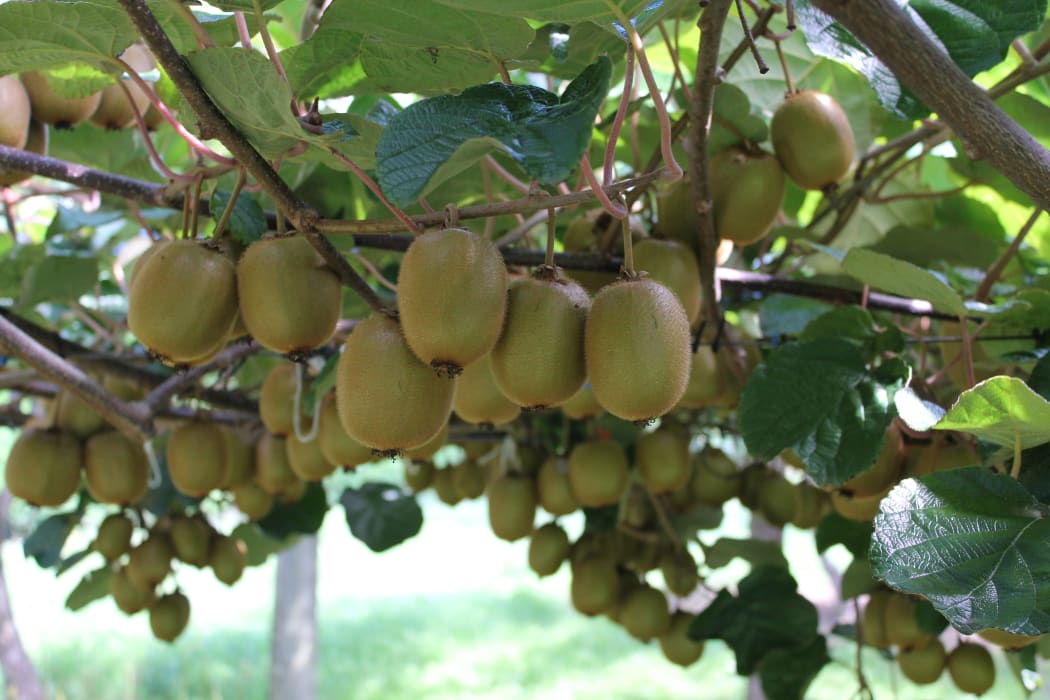This year's kiwifruit budding season may be one of the last in which the boom of audible bird scaring devices will be heard across Whakatāne District.

Photo: RNZ/Carol Stiles
Whakatāne District councillors have voted to initiate a plan change process that will see the loud bird-scaring devices outlawed or subject to more stringent rules.
Poroporo resident Sandy Pryde told councillors at a strategy and policy committee meeting last week that the noise was "horrendous" and neighbours of orchards had their lives disrupted unnecessarily when there were alternatives such as nets, flashing lights, and water jets.
During spring, kiwifruit orchardists use the loud boom of the devices to scare birds away from their crop. Loss of kiwifruit flower buds to birds can occur very quickly and can be devastating to orchards, reducing yield and therefore revenue.
The audible bird-scaring devices can be used between 7am and 7pm seven days a week up to 12 times an hour. They cannot exceed 100 decibels, about the same as a the noise of a train.
In comparison, the level of a normal conversation level is about 50 to 65 decibels.
"From what I've seen they have very limited impact, and the birds return within seconds," Pryde said.
"Depending on how the wind is blowing, it can sound as though it's at your back door."
Pryde brought with her a petition of support with 36 signatures from neighbours of orchards.
Councillor Wilson James said the problem was only getting worse as more and more dairy farms were converted to kiwifruit orchards.
He said this could mean neighbours were not subjected to just 12 booms per hour, but 12 booms multiplied by how many orchards are nearby.
"It's getting pretty hard not to be within one kilometre of an orchard," he said.
Councillor Alison Silcock agreed and said people moving into rural areas some 20 years ago could not have predicted how kiwifruit "would begin to take over" dairy farms.
Council staff recommended the council undertake a "community advocacy role" alongside monitoring of the use of audible bird scaring devices.
This would consist of the council raising awareness of the nuisance of audible bird-scaring devices with orchardists, and employment of a compliance monitoring officer during the budding season to ensure orchards were complying with the rules.
Councillor Julie Jukes was adamant the council needed to proceed with a plan change process which would see it undertake staff recommendations and also amend the rules governing audible bird-scaring devices after consultation with the public.
She said Whakatāne's rules appeared lenient and action was needed now to prevent the devices becoming a bigger issue in the future.
Other districts measure the sound of audible bird scaring devices differently, but Whakatāne allows the loudest single burst.
Mayor Judy Turner proposed an amendment to Juke's motion that the council proceed with a plan change only "if needed" after monitoring and advocacy has been carried out.
"It's my thinking that this plan change may not even be needed in a couple of years," Turner said.
Jukes did not agree to this amendment and Turner and councillor Victor Luca were the only ones who voted in its favour.
"Even if orchards are compliant, it will still be an issue," Jukes said.
"The district plan is too lenient, so we already know we need to do more than just monitoring."
James suggested some councillors would take the issue more seriously if there were orchards lining the Whakatane township boundary.
Monitoring of orchards using audible bird scaring devices will begin this budding season over August and September for council staff to gather information to inform the plan change process.
The plan change process may take up to two years as the council will need to undertake two submission processes and have hearings.

Local Democracy Reporting is a public interest news service supported by RNZ, the News Publishers' Association and NZ On Air.

